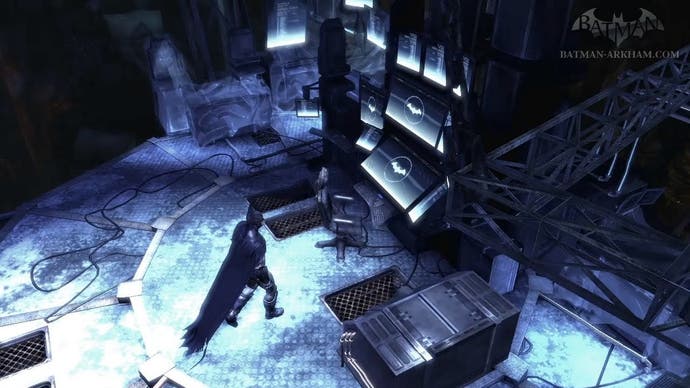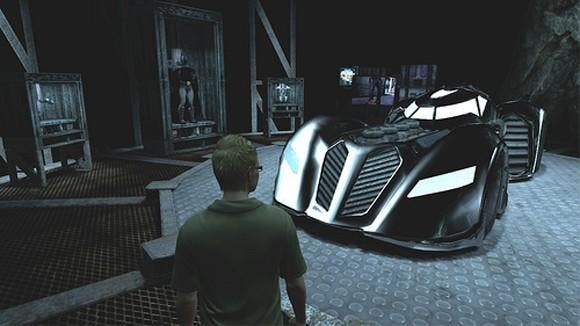Batman's dead in Gotham Knights, but are you really playing as Batman in Arkham Asylum?
To Dead Man's Point.
I don't know if you've read much about the new Batman game, Gotham Knights. I'll call it a Batman game for simplicity's sake. The truth is - as far as we've been told - this is actually a Batman game in which you don't play as Batman. Batman's dead, so instead you play as four members of the wider Bat family. In fact, this is probably what you've been reading about if you have been reading about the game.
This is all super interesting, I think. Gotham Knights is already a Batman game not made by Rocksteady, and now it doesn't have the main character either - as far as we've been told. I'm intrigued to see the results, but the whole discussion has also made me think about the first Batman game in this series, Arkham Asylum, and how you definitely play as Batman in that - except when it comes to my very favourite moment in the game, which is also the point at which the relationship between player and onscreen avatar becomes a little more complicated.
Firstly, yes, a lot of games complicate this relationship. You control the characters in GTA, for example, but when you're driving to a mission they're talking, and they're saying stuff that is probably a surprise to you, the player, so there's that gap there to ponder. You are the people on the screen, and you must be, because you tell them when to duck, when to reload. But they have a sliver of life that you will never quite get control of, because if you did, the game's narrative wouldn't work.
Back to Batman. Batman talks to Oracle and what have you, but that's fine for the most part, because you're the one sneaking him through vents and deciding in which order to take down goons. But then at a certain point in the game, Batman encounters Bane, and after defeating Bane, he's disturbed about something. Like the bit-part doctor in a million soap operas, he decides he has to do more tests. He needs to get to the Batcave. But he's trapped on Arkham, isn't he?
This is it: my favourite moment in Arkham Asylum - in any of the Batman games, in fact. You go to Dead Man's Point in North Arkham, a lovely bit of theatre that takes you away from the main stomping grounds of the narrative, and also gives you a melancholic view of Gotham itself, separated by water. You dive - or rather Batman dives, because we're in cutscene territory - from a cliff edge and then, swish, you're being scanned by lasers, and a wall of rock reveals a secret door. You walk through, into a corridor with electric lighting, through a shimmering wall of water - another lovely moment - and wow. You're here. A second Batcave on Arkham Island.
There are a lot of reasons why this works. The theatrical staging of the reveal. The growing awareness that Rocksteady is so comfortable with Batman's world that it's willing to create its own elements. The sheer star power of actually being in such a hallowed place. All fine. But the real reason it works is much more complicated, I think. The Batcave reveal works because Batman knows something that you don't: that he has a cave on this island in the first place. He knows something you don't know. Which is weird, because aren't you Batman in the first place? Isn't that the premise of the whole game?

Years ago I was taught about this concept: dramatic irony. Dramatic irony, I was told, is one of the most complex tools a writer can deploy. Dramatic irony occurs when the people in the audience know more than the people on screen. To use a simple Hitchcock example: two people are talking at a table, but only the audience knows there's a bomb underneath the table and it's counting down to the explosion.
Dramatic irony! At table level it's all chats about holidays and what the weather's like. Below the table, though, we, the audience, are screaming: get away! Stop talking! Don't even tip! There's a bomb you idiots.
Okay. Dramatic irony rarely needs a bomb in order to work. And it's rarely used only to create suspense. Maybe one character has had an affair, and we know about it but their partner doesn't. Maybe the kid's come home from school and we know what they got in that test but the parents don't. Maybe we know they earned Class President, or got expelled!
The Batcave sequence works because of a sort of reversed dramatic irony. Batman knows something and he hasn't shared it with us. All this time he's known there's a Batcave on the island. But we didn't need to know until now, even though we are him. Sort of. So he has this internal life that we are not privy to. There is a him without us.

You get this in a lot of movies too - caper movies are particularly rich in it. The audience think Danny Ocean's con failed, but only because Danny didn't let us into the true nature of the con in the first place. We followed him right until he got into the Bellagio's vault, and then he pushed us aside a bit and worked a solitary magic without us.
But you know where I'm going with this: that's fine, but we never really thought we were Danny Ocean up until that point. The film is exploiting a separation of protagonist and audience that everyone understands from the start. Arkham Asylum is a bit different. Games are a bit different
And I'm tempted to say that Batman is a bit different in general. We're not just playing a character in these games, we're playing a character who is already storied, already deeply famous, already slopping around in lore. Arkham Asylum's greatness, then, is that it doesn't always allow us to be Batman - sometimes we get to be near Batman while he does something cool that surprises us. Maybe Gotham Knights is drawing from a deeper well after all.


